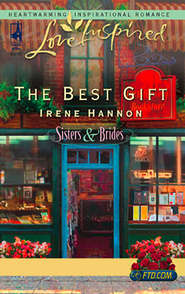По всем вопросам обращайтесь на: info@litportal.ru
(©) 2003-2025.
✖
The Way Home
Автор
Год написания книги
2018
Настройки чтения
Размер шрифта
Высота строк
Поля
Cal shrugged. “The owner and I go way back. Trust me. I’ll owe him for this,” he said over his shoulder with a grin. Then he stepped back and surveyed the table. “Now, all we need is a little candlelight, and we can pretend we’re actually at the restaurant.”
“That I can supply.”
As they leisurely made their way through the dinner, Amy realized that she was truly enjoying herself. Cal was a good conversationalist, moving with ease from topic to topic, displaying an impressive knowledge and insight on everything from world events to Broadway musicals. The more they talked, the more she realized how much they had in common. Their tastes in art and music were similar, and they were surprisingly in sync politically. It wasn’t until they started talking about more personal things, especially their careers, that their differences emerged.
“So tell me why you went into broadcast news,” he said as they sipped their coffee and dug into the rich dessert.
Amy cupped her chin in her hand. “For the glamour. And the excitement. Not to mention it pays well,” she said with a grin.
“Is money that important?”
“It is when you don’t have it.”
“So I take it you don’t come from a wealthy background.”
She made a face. “Hardly. I grew up on a farm in Ohio. We weren’t poor, but there was never any money to spare. It never bothered my sister, Kate. She was perfectly content with that life and had no desire to leave the farm. I, on the other hand, was drawn to the lights of the big city. I figured there was more to life than cows and plows, and I was determined to find it.”
“Have you?”
She looked surprised. “Sure. I mean, this—” her arm swept the room, with its panoramic view of the city lights “—is what I’ve always wanted.”
“And you’ve never looked back? Never questioned your decision?”
Amy shifted uncomfortably under his suddenly intense gaze. Funny he should ask that, when she’d done that very thing not long ago. But as she’d told herself then, it was too late for second thoughts. And anyway, she did like her life and her job.
“Not really. Sure, there are some parts of my job that I don’t particularly care for. But someday, if I play my cards right, I’ll snag an anchor slot and have the freedom to pick and choose the kind of stories I cover.”
“Such as?”
“Human-interest pieces. Stories about ordinary people who do extraordinary things. Feature reporting, more in-depth than what I do now, where you have the time to do stories that leave people uplifted and inspired. I get to do a bit of that now, but not nearly enough. It’s really satisfying to shine the light on good, decent people instead of the dregs of humanity who usually dominate the news. There are good people out there, and I like to find ways to give them their moment in the spotlight. I think it would also help young people to see that nice guys don’t always finish last.”
Amy had gotten more and more passionate as she spoke, and Cal’s attentive—and approving—gaze, as well as the sudden warmth in his eyes, brought a flush to her cheeks. She didn’t usually get so carried away, nor did she typically reveal so much about her personal feelings. She had no idea why she’d done so tonight. She did know it was time to shift the focus. “So now you know all the reasons why I left the farm and never looked back,” she finished lightly. “And how about you? What’s your background? How did you get into law?”
He gave her a quick smile. “I guess turnabout is fair play. I grew up in Tennessee, in the shadow of the Smoky Mountains. Unlike you, I had to think long and hard about leaving.”
“Why did you?”
He shrugged. “A lot of reasons. For one thing, law seemed like a career where I could do some good, help people, advance the cause of justice. I was pretty idealistic in the early days.”
His reasons for his career choice made many of Amy’s sound shallow and self-serving, she realized, and she took a sip of coffee while she mulled over his answer—especially the past tense in the last sentence. “And you aren’t idealistic anymore?”
His eyes grew troubled. “When the system works the way it’s supposed to, when I can really help someone and justice is served, it’s incredibly satisfying,” he said slowly. “Unfortunately, that doesn’t happen nearly often enough.”
“Is it happening in the Jamie Johnson case?”
“I guess we’ll see when the verdict comes in.”
“But you think he’s guilty.”
“I’m prosecuting him.”
“You’re avoiding the question, Counselor.”
“That’s right.”
She sighed. He’d easily deflected her few subtle probes about the trial during the evening. So far, she had nothing usable, no lead that would give her the edge she so badly wanted. Then again, she hadn’t pressed all that hard. For some reason, her heart just hadn’t been in it. Besides, it had quickly become apparent to her that while she was a good reporter who knew how to ask the right questions, he was an even better attorney who knew how to avoid answering them.
Вы ознакомились с фрагментом книги.
Приобретайте полный текст книги у нашего партнера:
Приобретайте полный текст книги у нашего партнера:











